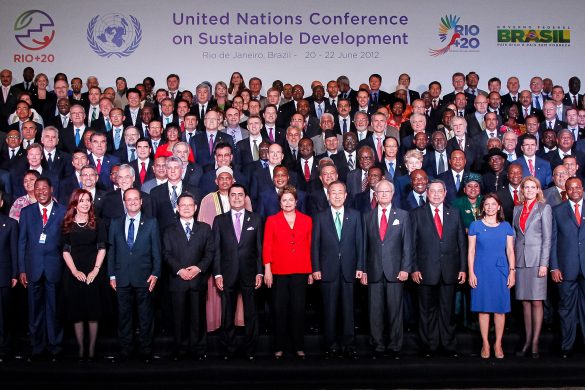Der er ikke nok tilgængelig landbrugsjord til at nå de bæredygtige udviklingsmål. Det er konklusion fra forskere, der netop har offentliggjort to undersøgelser af målenes indbyrdes sammenhæng.
De bæredygtige udviklingsmål skal efter planen vedtages ved FN’s Generalforsamling i september i New York.
Scientists concluded during the presentation of their studies on Monday (April 20, red.) that the huge demand for land and biomass implicit in the individual SDGs (udviklingsmålene, Sustainable Development Goals, red.) will affect the future availability of land and potentially impede the fulfilment of the goals.
The conclusion was based on two studies conducted by the IASS (Institute of Advanced Sustainability Studies), UNEP’s International Resource Panel (IRP) and the International Institute for Applied Systems Analysis (IIASA).
The studies investigate the effectiveness and sustainability of the proposed 17 SDGs with regard to the huge and still growing demand for resources such as land and biomass.
In their publication, Grounding the Post-2015 Development Agenda: Options for the Protection of our Precious Soil and Land Resources, the IASS and partners formulate concrete policy recommendations.
Land demands exceed our resources
The land demands made in the SDGs exceed our existing land resources. The IIASA study examines the economic links, co-benefits, and trade-offs between the different SDG aims, particularly between land, food and water resources.
Conservation efforts focused on one resource or region can drive prices up, leading to food insecurity and even greater exploitation of other resources.
“The Competition for resources concerns all 17 of the SDGs,” warned Michael Obersteiner, Programme Director of Ecosystem Services and Management at IIASA.
“Only a systems approach can help to reveal critical interdependencies and avoid zero-sum outcomes as nations craft policies to implement the goals,” he argued when presenting the IIASA study commissioned by the IRP.
SDGs make more land demands than we can possibly meet
Twelve of the proposed SDGs relate to the sustainable use of natural resources and several depend on the use of additional land resources, for example, the goals on food security (Goal 2), energy supply (Goal 7), production and consumption (Goal 12) and the sustainable use of ecosystems (Goal 15).
IASS Executive Director Klaus Töpfer concluded:
“The 17 SDGs are therefore not consistent. The demands for biomass and land that they make are far more than we can possibly meet. We need to set priorities, for example, where food security is concerned.”
The IASS study emphasises the need to find democratic ways of balancing the demands implied by the SDGs during their implementation at national level.
Consumers also have an important role to play. The choices we make are of great importance: not just our decisions on what to consume, but also our decision to buy food in such a way that it does not end up being wasted.
Ernst Ulrich von Weizsäcker, member and formerly co-chair of the IRP, said:
“It is only natural that the ecological targets in the SDGs come up against brick walls, while the social and economic goals strive for more and more growth. It’s a huge conflict and thus a problem of distribution: our planet’s resources are finite, so the rich need to give away some of their wealth. Otherwise the current inequities will remain.”
Mette Wilkie, director of UNEP’s Division of Environmental Policy and Implementation, concluded: “The two studies highlight the fact that business as usual is no longer an option. We need to change the way in which we manage and use our natural resources and move towards sustainable production and consumption patterns.”
Læs artiklen i sin helhed her: http://www.iass-potsdam.de/en/news-media/news/are-sustainable-development-goals-sustainable-new-research-findings-presented-3rd
De 17 bæredygtige udviklingsmål kan læses her: https://sustainabledevelopment.un.org/sdgsproposal















